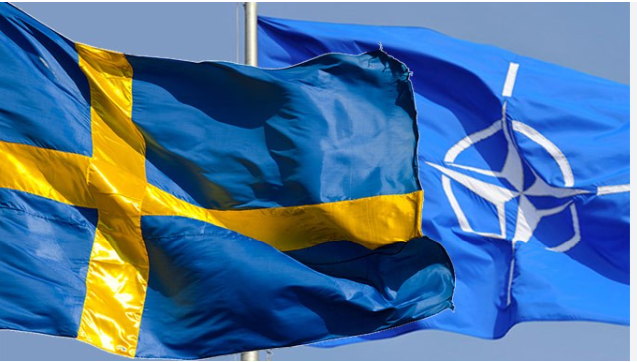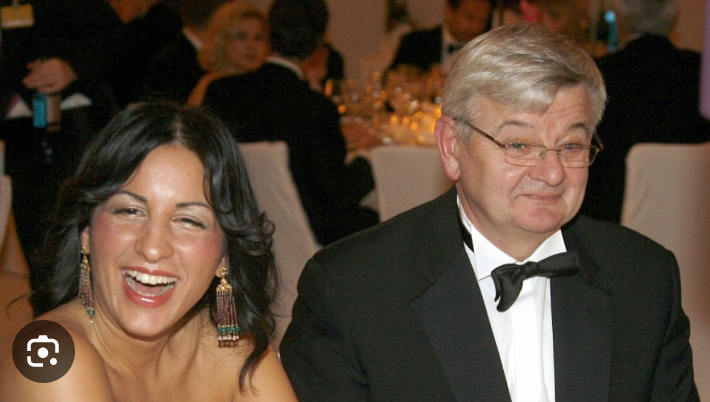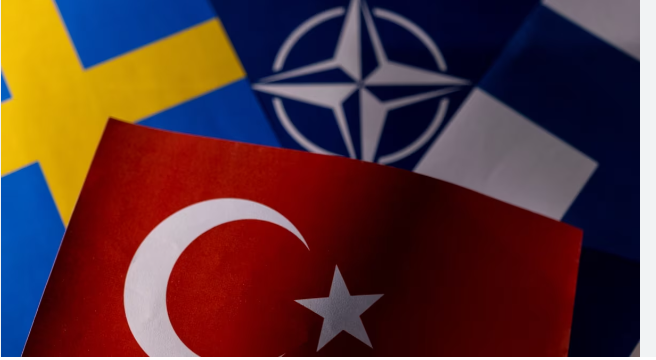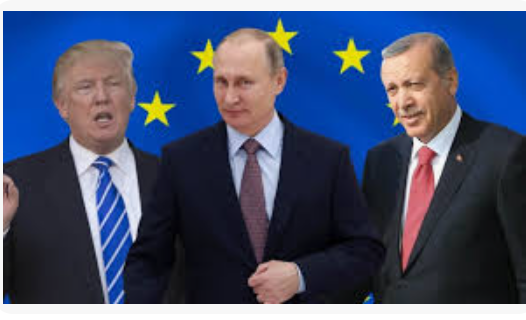Marc Pierini: Can Erdogan and EU see eye to eye?
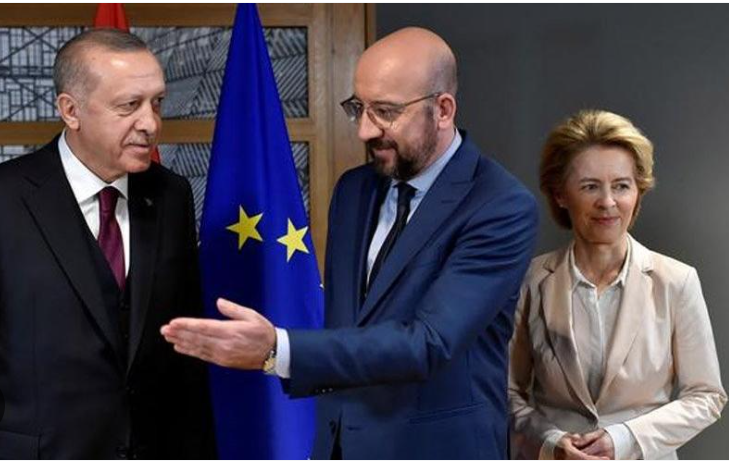 rte ab
rte ab
Turkey’s approach to EU
The Turkish president’s narrative in Vilnius, where he linked Sweden’s entry into NATO with Turkey’s entry into the EU, came out of the blue. As the two accession processes are totally distinct legal issues, the EU and German Chancellor Olaf Scholz promptly dismissed the Turkish leadership’s request to make the former dependent on the latter.
This request was followed on August 7 by Fidan’s formal expression of Turkey’s approach to the EU: in his words, “the European Union cannot truly be a global actor without Türkiye” and Turkey’s disrupted EU accession process is tantamount to “strategic blindness.” This statement seemed to run counter to Ankara’s proclaimed ambition to revamp its EU accession process.
Having been in use for several years, Turkey’s belittling narrative of the EU’s “strategic blindness” cannot simply be dismissed as an off-the-cuff expression. It sounds like deeply rooted official thinking, or at least an essential part of the head of state’s narrative. The phrase may have domestic political benefits, as it flatters the prevailing nationalist mood and perpetuates the image of an inimical Brussels. Given the local elections scheduled for March 2024, these words against the EU might simply be another tool in the populist electoral toolbox. Nevertheless, few in Brussels or EU national capitals genuinely believe that Erdoğan has any real intention of dismantling his constitutional edifice to satisfy EU criteria on the rule of law.
Some observers contend that Western countries’ relations with Erdoğan’s Turkey can only be transactional at this point. According to Aslı Aydıntaşbaş and Jeremy Shapiro of the European Council on Foreign Relations, “Erdogan has . . . little patience for Western lectures on human rights. Short-term improvements in human rights and democratic freedoms in Turkey are thus unlikely, no matter what the West does. . . . Creating a more realistic relationship with a post-Western Turkey, one based on mutually beneficial transactions, would be a good place to start.”
[embed]https://www.youtube.com/watch?v=Ce5SZ3HqFD0&t=35s[/embed]
Others argue that since the May elections, there has been a distinct tendency in Ankara to patch up relations with Western countries, but only on Erdoğan’s terms. This assessment might prove true given Erdoğan’s ultimate control of policy decisions and inflexibility when it comes to political diversity and dissenting opinions. But the geopolitical picture is wider than Turkey.
THE NEW GEOPOLITICAL CONTEXT
War is back on the European continent, and Russia is up against Ukraine, NATO, and the EU. This is an entirely new geopolitical context, and it inevitably reshuffles the cards for EU-Turkey relations.
The return of war has made Europe-wide unity an absolute political priority, as illustrated by the large number of decisions made by the EU, NATO, and the broader West to support Ukraine by providing armaments and macrofinancial support and to counter Russia’s actions by reorganizing energy supplies and imposing sanctions.
In the wake of Russia’s unprovoked invasion of Ukraine, European leaders made two political decisions of historic significance: the EU gave Moldova and Ukraine the status of candidate countries, while the leaders of Finland and Sweden renounced their countries’ neutrality and applied to join NATO. Similarly, the rule-of-law crisis between the EU and Hungary and Poland has shown that under duress, European governments and institutions can reinforce their political resolve.
The actions taken by European leaders in these diverse policy domains follow a common thread. Challenged by Russia, the EU is firmly upholding its political, legal, and economic standards: respect for territorial integrity as well as respect for the rule of law, including human rights, an independent judiciary, free media and civil society, and the fight against corruption. The Russian invasion of Ukraine has to an extent reinforced the EU’s cohesiveness and unity, though with notable difficulties when it comes to Hungary.
By contrast, and despite official narratives to the contrary, the degree of convergence between Turkey’s rule-of-law architecture and the EU’s requirements of candidate countries has been drastically reduced. This trend was formalized with Turkey’s 2017 constitutional reform and was illustrated by the 2023 electoral process when the government made last-minute changes to the electoral law in favor of the Nationalist Movement Party (MHP), which is allied to the AKP, and the leading opposition candidate for the presidency, İmamoğlu, was condemned on spurious charges before the election.
[embed]https://www.youtube.com/watch?v=vQPolEQQ9WA&t=12s[/embed]
The real issue is whether these policy choices are worthy of Turkey’s ambition to be a global player. Indeed, Ankara’s policy direction has a price: without a real move on the rule of law and emblematic measures such as the final closure of the cases against İmamoğlu and other high-profile prisoners, including Selahattin Demirtaş and Osman Kavala, no close relationship will develop between the EU and Turkey, and the country’s relations within NATO will also be affected. The personal standing of Turkey’s president will inevitably be impacted, too.
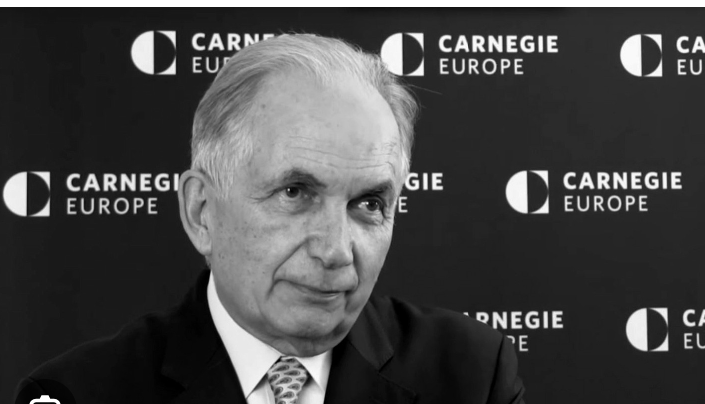 In such a context, the policy decisions of Turkey—a member of NATO and the Council of Europe—are now observed in Europe from a different standpoint. The benchmark here is not just a specific political development, such as an extended agreement on refugees, a revamped customs union, or a prolonged deadlock over Sweden’s accession to NATO. Rather, discussions will hinge on whether a far broader understanding can be reached with Turkey on the continent’s emerging political, security, and economic architecture.
In addition, Russia’s invasion of Ukraine is only one development in a rapidly changing global geopolitical environment. The Gulf monarchies want a bigger say in world affairs and have used their financial clout for political gain. With Turkey, they have signed deals (the details of which are often unknown to outsiders) that come with requests for a return to orthodox policies and an ambition to acquire profitable Turkish firms. The Gulf states’ political agendas cover countries in which Turkey is active: Libya, Syria, and others in Africa. The Gulf monarchies may have entered into strategic partnerships with Turkey, but not just on Turkish terms.
Similarly, the notion of the global South—a concept challenged by some—expanded on August 24 when the BRICS club comprising Brazil, Russia, India, China, and South Africa accepted six new members: Argentina, Egypt, Ethiopia, Iran, Saudi Arabia, and the UAE. Several more countries had also applied. Turkey has global leadership ambitions, but it is far from alone in hoping to influence international affairs.
To put it differently, Turkey’s stated goal of strengthening its “position as a fully independent, effective, and influential actor, which sets the international agenda, and sets or breaks the game when necessary” requires a high degree of consistency between its policy decisions and its existing role as a player on the European continent and in NATO. In particular, in a wider competition for global leadership, countries that aim at setting the agenda will have to make proposals and rally others around them—that is, in a constructive way. Countries that opt just to be disruptive, such as Russia, will be those that break the game. Being both constructive and disruptive will harm policy consistency.
In the economic domain, Turkey will have to ponder its crucial links and shared interests with Europe, especially the EU, in terms of trade, investment, technology, innovation, norms, and standards. In these vital areas, given its economic fundamentals, Turkey has few alternatives at its disposal. Beyond energy and politically motivated cash transfers, Russia has next to nothing to offer Turkey when it comes to industrial development, research, or exports. Gulf countries have cash but no technology. As financial operators looking for a return on their investments, they are not keen to give blind cash handouts and may prefer to acquire the most profitable state-owned companies. Other Middle Eastern and African countries certainly offer opportunities in terms of trade and defense sales, but they will not propel Turkey into the world’s top ten economies—as per Ankara’s stated goal.
Turkey needs to rebuild confidence with European business operators and financial institutions to restart the flow of short-term funds and foreign direct investment. The potential for technology and innovation exchanges with the EU is vast, especially at a time when supply chains are being restructured after the coronavirus pandemic and the ensuing recession.
In view of Turkey’s domestic evolution and global changes, the question arises of whether EU accession was ever the ideal policy vehicle for the country. The EU’s accession requirements are simply incompatible with Erdoğan’s chosen governance structures and style. Yet, the enlargement criteria will not change, as stated by EU Commissioner Olivér Várhelyi on September 12. Outside the EU accession framework, the rule-of-law requirements of governments and business circles will also remain. How to reconcile these seemingly incompatible tracks—rule-of-law requirements and institutionalized autocracy—will be the key topic of future discussions between Ankara and Brussels.
Ultimately, the EU will not collapse if Turkey prefers a different model of government. Turkey will not collapse either, but without a normalized relationship with the EU it may be a less relevant actor on the global stage.
CONCLUSION
The world is witnessing momentous geopolitical changes in continental Europe and beyond. In parallel, Turkey is reorienting its foreign policy and expanding its global role. Turkey is obviously free to follow its own trajectory. What remains to be seen is how the country will balance its global geopolitical ambitions with its European neighborhood and its core economic interests and constraints. Amid a massive upheaval in world geopolitics, it has become crucial for all players to make a workable assessment of international realities.
Excerpt from “Turkey’s European Goals: Prospects and Impediments as Seen From Brussels”
Follow our English language YouTube videos @ REAL TURKEY: https://www.youtube.com/channel/UCKpFJB4GFiNkhmpVZQ_d9Rg
And content at Twitter: @AtillaEng
Facebook: https://www.facebook.com/realturkeychannel
In such a context, the policy decisions of Turkey—a member of NATO and the Council of Europe—are now observed in Europe from a different standpoint. The benchmark here is not just a specific political development, such as an extended agreement on refugees, a revamped customs union, or a prolonged deadlock over Sweden’s accession to NATO. Rather, discussions will hinge on whether a far broader understanding can be reached with Turkey on the continent’s emerging political, security, and economic architecture.
In addition, Russia’s invasion of Ukraine is only one development in a rapidly changing global geopolitical environment. The Gulf monarchies want a bigger say in world affairs and have used their financial clout for political gain. With Turkey, they have signed deals (the details of which are often unknown to outsiders) that come with requests for a return to orthodox policies and an ambition to acquire profitable Turkish firms. The Gulf states’ political agendas cover countries in which Turkey is active: Libya, Syria, and others in Africa. The Gulf monarchies may have entered into strategic partnerships with Turkey, but not just on Turkish terms.
Similarly, the notion of the global South—a concept challenged by some—expanded on August 24 when the BRICS club comprising Brazil, Russia, India, China, and South Africa accepted six new members: Argentina, Egypt, Ethiopia, Iran, Saudi Arabia, and the UAE. Several more countries had also applied. Turkey has global leadership ambitions, but it is far from alone in hoping to influence international affairs.
To put it differently, Turkey’s stated goal of strengthening its “position as a fully independent, effective, and influential actor, which sets the international agenda, and sets or breaks the game when necessary” requires a high degree of consistency between its policy decisions and its existing role as a player on the European continent and in NATO. In particular, in a wider competition for global leadership, countries that aim at setting the agenda will have to make proposals and rally others around them—that is, in a constructive way. Countries that opt just to be disruptive, such as Russia, will be those that break the game. Being both constructive and disruptive will harm policy consistency.
In the economic domain, Turkey will have to ponder its crucial links and shared interests with Europe, especially the EU, in terms of trade, investment, technology, innovation, norms, and standards. In these vital areas, given its economic fundamentals, Turkey has few alternatives at its disposal. Beyond energy and politically motivated cash transfers, Russia has next to nothing to offer Turkey when it comes to industrial development, research, or exports. Gulf countries have cash but no technology. As financial operators looking for a return on their investments, they are not keen to give blind cash handouts and may prefer to acquire the most profitable state-owned companies. Other Middle Eastern and African countries certainly offer opportunities in terms of trade and defense sales, but they will not propel Turkey into the world’s top ten economies—as per Ankara’s stated goal.
Turkey needs to rebuild confidence with European business operators and financial institutions to restart the flow of short-term funds and foreign direct investment. The potential for technology and innovation exchanges with the EU is vast, especially at a time when supply chains are being restructured after the coronavirus pandemic and the ensuing recession.
In view of Turkey’s domestic evolution and global changes, the question arises of whether EU accession was ever the ideal policy vehicle for the country. The EU’s accession requirements are simply incompatible with Erdoğan’s chosen governance structures and style. Yet, the enlargement criteria will not change, as stated by EU Commissioner Olivér Várhelyi on September 12. Outside the EU accession framework, the rule-of-law requirements of governments and business circles will also remain. How to reconcile these seemingly incompatible tracks—rule-of-law requirements and institutionalized autocracy—will be the key topic of future discussions between Ankara and Brussels.
Ultimately, the EU will not collapse if Turkey prefers a different model of government. Turkey will not collapse either, but without a normalized relationship with the EU it may be a less relevant actor on the global stage.
CONCLUSION
The world is witnessing momentous geopolitical changes in continental Europe and beyond. In parallel, Turkey is reorienting its foreign policy and expanding its global role. Turkey is obviously free to follow its own trajectory. What remains to be seen is how the country will balance its global geopolitical ambitions with its European neighborhood and its core economic interests and constraints. Amid a massive upheaval in world geopolitics, it has become crucial for all players to make a workable assessment of international realities.
Excerpt from “Turkey’s European Goals: Prospects and Impediments as Seen From Brussels”
Follow our English language YouTube videos @ REAL TURKEY: https://www.youtube.com/channel/UCKpFJB4GFiNkhmpVZQ_d9Rg
And content at Twitter: @AtillaEng
Facebook: https://www.facebook.com/realturkeychannel
 In such a context, the policy decisions of Turkey—a member of NATO and the Council of Europe—are now observed in Europe from a different standpoint. The benchmark here is not just a specific political development, such as an extended agreement on refugees, a revamped customs union, or a prolonged deadlock over Sweden’s accession to NATO. Rather, discussions will hinge on whether a far broader understanding can be reached with Turkey on the continent’s emerging political, security, and economic architecture.
In addition, Russia’s invasion of Ukraine is only one development in a rapidly changing global geopolitical environment. The Gulf monarchies want a bigger say in world affairs and have used their financial clout for political gain. With Turkey, they have signed deals (the details of which are often unknown to outsiders) that come with requests for a return to orthodox policies and an ambition to acquire profitable Turkish firms. The Gulf states’ political agendas cover countries in which Turkey is active: Libya, Syria, and others in Africa. The Gulf monarchies may have entered into strategic partnerships with Turkey, but not just on Turkish terms.
Similarly, the notion of the global South—a concept challenged by some—expanded on August 24 when the BRICS club comprising Brazil, Russia, India, China, and South Africa accepted six new members: Argentina, Egypt, Ethiopia, Iran, Saudi Arabia, and the UAE. Several more countries had also applied. Turkey has global leadership ambitions, but it is far from alone in hoping to influence international affairs.
To put it differently, Turkey’s stated goal of strengthening its “position as a fully independent, effective, and influential actor, which sets the international agenda, and sets or breaks the game when necessary” requires a high degree of consistency between its policy decisions and its existing role as a player on the European continent and in NATO. In particular, in a wider competition for global leadership, countries that aim at setting the agenda will have to make proposals and rally others around them—that is, in a constructive way. Countries that opt just to be disruptive, such as Russia, will be those that break the game. Being both constructive and disruptive will harm policy consistency.
In the economic domain, Turkey will have to ponder its crucial links and shared interests with Europe, especially the EU, in terms of trade, investment, technology, innovation, norms, and standards. In these vital areas, given its economic fundamentals, Turkey has few alternatives at its disposal. Beyond energy and politically motivated cash transfers, Russia has next to nothing to offer Turkey when it comes to industrial development, research, or exports. Gulf countries have cash but no technology. As financial operators looking for a return on their investments, they are not keen to give blind cash handouts and may prefer to acquire the most profitable state-owned companies. Other Middle Eastern and African countries certainly offer opportunities in terms of trade and defense sales, but they will not propel Turkey into the world’s top ten economies—as per Ankara’s stated goal.
Turkey needs to rebuild confidence with European business operators and financial institutions to restart the flow of short-term funds and foreign direct investment. The potential for technology and innovation exchanges with the EU is vast, especially at a time when supply chains are being restructured after the coronavirus pandemic and the ensuing recession.
In view of Turkey’s domestic evolution and global changes, the question arises of whether EU accession was ever the ideal policy vehicle for the country. The EU’s accession requirements are simply incompatible with Erdoğan’s chosen governance structures and style. Yet, the enlargement criteria will not change, as stated by EU Commissioner Olivér Várhelyi on September 12. Outside the EU accession framework, the rule-of-law requirements of governments and business circles will also remain. How to reconcile these seemingly incompatible tracks—rule-of-law requirements and institutionalized autocracy—will be the key topic of future discussions between Ankara and Brussels.
Ultimately, the EU will not collapse if Turkey prefers a different model of government. Turkey will not collapse either, but without a normalized relationship with the EU it may be a less relevant actor on the global stage.
CONCLUSION
The world is witnessing momentous geopolitical changes in continental Europe and beyond. In parallel, Turkey is reorienting its foreign policy and expanding its global role. Turkey is obviously free to follow its own trajectory. What remains to be seen is how the country will balance its global geopolitical ambitions with its European neighborhood and its core economic interests and constraints. Amid a massive upheaval in world geopolitics, it has become crucial for all players to make a workable assessment of international realities.
Excerpt from “Turkey’s European Goals: Prospects and Impediments as Seen From Brussels”
Follow our English language YouTube videos @ REAL TURKEY: https://www.youtube.com/channel/UCKpFJB4GFiNkhmpVZQ_d9Rg
And content at Twitter: @AtillaEng
Facebook: https://www.facebook.com/realturkeychannel
In such a context, the policy decisions of Turkey—a member of NATO and the Council of Europe—are now observed in Europe from a different standpoint. The benchmark here is not just a specific political development, such as an extended agreement on refugees, a revamped customs union, or a prolonged deadlock over Sweden’s accession to NATO. Rather, discussions will hinge on whether a far broader understanding can be reached with Turkey on the continent’s emerging political, security, and economic architecture.
In addition, Russia’s invasion of Ukraine is only one development in a rapidly changing global geopolitical environment. The Gulf monarchies want a bigger say in world affairs and have used their financial clout for political gain. With Turkey, they have signed deals (the details of which are often unknown to outsiders) that come with requests for a return to orthodox policies and an ambition to acquire profitable Turkish firms. The Gulf states’ political agendas cover countries in which Turkey is active: Libya, Syria, and others in Africa. The Gulf monarchies may have entered into strategic partnerships with Turkey, but not just on Turkish terms.
Similarly, the notion of the global South—a concept challenged by some—expanded on August 24 when the BRICS club comprising Brazil, Russia, India, China, and South Africa accepted six new members: Argentina, Egypt, Ethiopia, Iran, Saudi Arabia, and the UAE. Several more countries had also applied. Turkey has global leadership ambitions, but it is far from alone in hoping to influence international affairs.
To put it differently, Turkey’s stated goal of strengthening its “position as a fully independent, effective, and influential actor, which sets the international agenda, and sets or breaks the game when necessary” requires a high degree of consistency between its policy decisions and its existing role as a player on the European continent and in NATO. In particular, in a wider competition for global leadership, countries that aim at setting the agenda will have to make proposals and rally others around them—that is, in a constructive way. Countries that opt just to be disruptive, such as Russia, will be those that break the game. Being both constructive and disruptive will harm policy consistency.
In the economic domain, Turkey will have to ponder its crucial links and shared interests with Europe, especially the EU, in terms of trade, investment, technology, innovation, norms, and standards. In these vital areas, given its economic fundamentals, Turkey has few alternatives at its disposal. Beyond energy and politically motivated cash transfers, Russia has next to nothing to offer Turkey when it comes to industrial development, research, or exports. Gulf countries have cash but no technology. As financial operators looking for a return on their investments, they are not keen to give blind cash handouts and may prefer to acquire the most profitable state-owned companies. Other Middle Eastern and African countries certainly offer opportunities in terms of trade and defense sales, but they will not propel Turkey into the world’s top ten economies—as per Ankara’s stated goal.
Turkey needs to rebuild confidence with European business operators and financial institutions to restart the flow of short-term funds and foreign direct investment. The potential for technology and innovation exchanges with the EU is vast, especially at a time when supply chains are being restructured after the coronavirus pandemic and the ensuing recession.
In view of Turkey’s domestic evolution and global changes, the question arises of whether EU accession was ever the ideal policy vehicle for the country. The EU’s accession requirements are simply incompatible with Erdoğan’s chosen governance structures and style. Yet, the enlargement criteria will not change, as stated by EU Commissioner Olivér Várhelyi on September 12. Outside the EU accession framework, the rule-of-law requirements of governments and business circles will also remain. How to reconcile these seemingly incompatible tracks—rule-of-law requirements and institutionalized autocracy—will be the key topic of future discussions between Ankara and Brussels.
Ultimately, the EU will not collapse if Turkey prefers a different model of government. Turkey will not collapse either, but without a normalized relationship with the EU it may be a less relevant actor on the global stage.
CONCLUSION
The world is witnessing momentous geopolitical changes in continental Europe and beyond. In parallel, Turkey is reorienting its foreign policy and expanding its global role. Turkey is obviously free to follow its own trajectory. What remains to be seen is how the country will balance its global geopolitical ambitions with its European neighborhood and its core economic interests and constraints. Amid a massive upheaval in world geopolitics, it has become crucial for all players to make a workable assessment of international realities.
Excerpt from “Turkey’s European Goals: Prospects and Impediments as Seen From Brussels”
Follow our English language YouTube videos @ REAL TURKEY: https://www.youtube.com/channel/UCKpFJB4GFiNkhmpVZQ_d9Rg
And content at Twitter: @AtillaEng
Facebook: https://www.facebook.com/realturkeychannel


